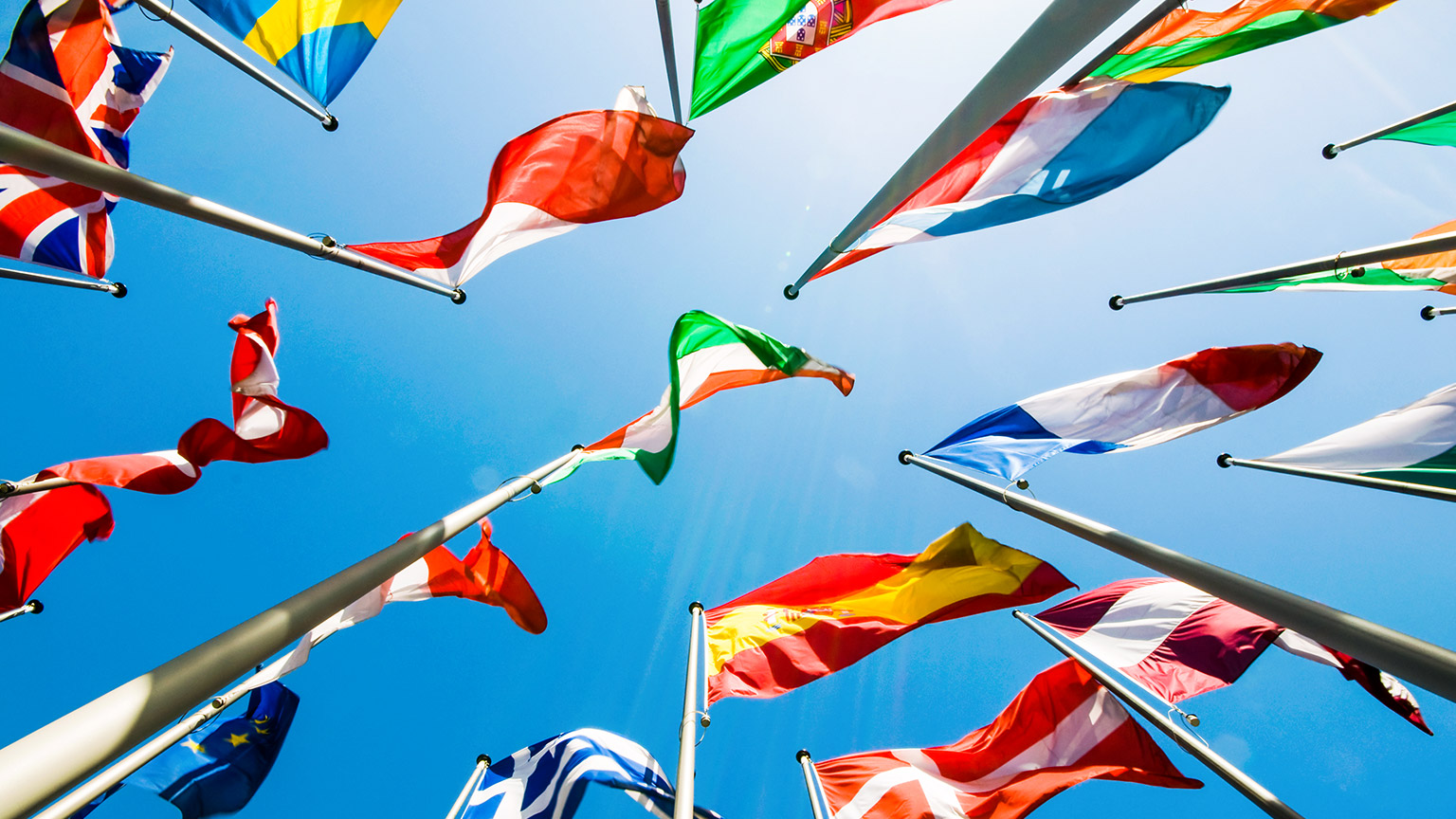Welcome to International Law. In this topic you will learn about the:
- Definition of international law
- Relationship between national vs. international law
- History and development
- Sources of international law
- Investment in foreign markets.
The sources of international law are very different from the sources of domestic law. As you progress through the learning, there will be focus is on international conventions or agreements made between countries. An 'international convention' is a treaty. There are a number of terms used to describe treaties, including Agreements, Acts, Conventions, Declarations and Protocols. The name alone does not affect the binding force of the instruments or its characterisation as a treaty. Australia, like other nation states, has its own treaty making process. You will be asked to examine this as you progress and have been provided with essential resources throughout the learning content.

International law is a body of rules, which regulate the behaviour of states and other entities in their relations with each other, at any given time.
International law can be broken down into the following categories:
- Public law
- Private international law (or conflict of laws)
- Supranational law.
We will take a closer look at each of these, but before you commence your reading, spend some time on the webpage Principles of Public International Law. This webpage considers the important principles of public international law with which you need to be familiar.
To navigate through the website, access the left-hand menu and read the material on Sources of International Law, International Law and Self Determination and Enforcement of International Law.
Public international law
Public international law refers to the laws that governs the relationship between states and international entities and includes:
- treaty law
- law of the sea
- international criminal law
- laws of war
- international humanitarian law, human rights law.
Private international law/conflict of laws
Private international law is a part of national law, and commonly deals with disputes between individuals belonging to different jurisdictions and addresses the questions of:
- Which court may hear a case?
- Which law concerning which jurisdiction applies to the issues in the case?
Supranational law
Supranational law concerns regional agreements where the laws of nation-states may be held inapplicable if they conflict with a supranational legal system, when that nation has a treaty obligation to a supranational collective such as the European Union.

As you understand the history of international law, you will become familiar with the development that has taken place over the years.
International law is relatively recent in its origin. Initially, states needed to co-exist and it was necessary to establish limits of state action. The earliest expressions consisted of rules of war and diplomatic relations. Today, states are in greater contact with each other compared to their initial co-existence. Any issues of international concern place a high demand on co-operation. Domestic matters are now subject to external review.
The following video provides an excellent overview of the history of international law.

International law and domestic law are vastly different from one another.
- International law: International law is characterised by being decentralised, based on the concepts of consent, flexibility, and reciprocity.
- Domestic law: In contrast to international law, domestic law is centralised and imposed.
Understanding international law
International law as you have learnt outlines a body of rules regulating the behaviour of states. However, according to the United Nations (2020) international law is also a domain which incorporates a wide range of issues of international concern including:
- human rights disarmament
- international crime
- refugees
- migration
- problems of nationality
- the treatment of prisoners
- use of force
- conduct of war.
International Court of Justice
The International Court of Justice (ICJ) is the principal judicial body of the United Nations (UN). The ICJ settles legal disputes submitted to it by States in agreement with international law. Acceptance of its jurisdiction is based on consent and is not mandatory. The Court also gives advisory opinions on legal questions referred from authorised UN bodies and agencies. The Court is composed of 15 judges, who are elected for a nine-year term by the General Assembly and the Security Council (United Nations, 2020).
Judicature
Judicature refers to the judicial branch of government which includes people connected with the court system and the administration of justice.
Before you continue reading, access the website Domestic Treaty-Making Process . It will establish your understanding of how each country has its own process for making treaties. Read the information on this webpage that explains the treaty-making process in Australia. As you navigate through the resource make sure you read the following sections:
- What a treaty is
- Treaties, the constitution and national interest
- Negotiating and implementing treaties.
This page also contains a link to a database of treaties made by Australia. You may like to explore the range of treaties Australia is a party to.
Sources of international law defined
The sources of international law are different from the sources of domestic law. Source of international law include:
- Article 38 of the Statute of the International Court of Justice. This court is located in The Hague and hears disputes between states.
- international conventions (includes treaties)
- customary international law
- general principles of law recognised by civilised nations
- judicial decisions and the teachings of the most highly qualified publicists of the various nations.
Select the following titles for more information on formal and material sources of legal information.
- Treaties
- International custom
- General principles of law recognised by civilised nations.
- Judicial decisions and teachings of jurists.
Hierarchy of sources
The hierarchy of sources refers to the materials and processes that help define the rules and principles used to regulate the international community. According to the Article 38 (1) of the Statute of the ICJ, the hierarchy of sources are as follows:
- Any treaty provision existing between the parties to the dispute must be applied.
- If there is no treaty, then a rule of international custom is implemented.
- If there is neither a prevailing treaty provision nor a custom, then general principles apply.
- In the absence of any of these, judicial decisions of national or lower courst, and scholarly writings are referred to.
Customary international law
Customary international law is the ‘common law’ of the law of nations and consists of a vast body of rules that, until the 20th century, constituted the chief body of international law. Customary international law is created by continuous customary practice and is sometimes used to interpret treaties.
Other sources of international law
There are several additional sources of international law including
- UN resolutions
- security council resolutions
- regional organisations for example, the Council of Europe
- soft law which is non-legally binding international instruments
- jus cogens (sometimes referred to as lus cogens) which is Latin for ‘compelling law or certain fundamental, overriding principles of international law’ (Cornell Law School, 2020).
Areas of international law
Areas of international law include:
- international waters
- human rights
- international crimes
- global communication
- global trade
- environmental law
- outer space.

The following information outlines the various types of legal systems pertaining to international law. Each legal system has a specific relevance to a culture, custom or tradition.
Common law
Common law applies to the United States, Britain and former colonies. Common law is based on equity and derived from custom and judicial precedent rather than from statutes.
Civil law
Civil law is based on Roman law and is commonly upheld in Europe and Latin America.
Other families of law
There are other families of law and these include:
- Islamic
- Hindu
- Socialist.
An example of Islamic law is Case 24.1 Awad v. Ziriax (2012) in which the district court did not abuse its discretion when it enjoined a state constitutional amendment which prohibited the state courts from considering Sharia law. The following two-minute video gives a brief explanation of Sharia law.
National laws can affect international business and governmental affairs. For example, constraints on foreign ownership such as:
- nationalisation
- expropriation
- confiscation,
- privatisation.
To assist businesses looking to invest abroad the U.S. Overseas Private Investment Corporations (OPIC) organisation provides insurance for eligible U.S. investors.
Export laws
Did you know? The Wassenaar arrangement was established in order to contribute to regional and international security and stability. The agreement promotes openness and greater responsibility in transfers of conventional arms and dual-use goods and technologies, therefore preventing threatening accumulations. The aim is also to prevent the acquisition of these items by terrorists (Wassenaar Arrangement, 2020).
Sanctions
Sanctions and embargoes are other considerations.
- Sanctions: When one country (or group of countries) may impose sanctions such as a trade barrier or tariff on another country in an effort to influence their behaviour.
- Embargoes: A embargoe is similar to a sanction but often implies a more severe sanction, for example, a ban on trade or activity with a particular country.
The U.S. Foreign Corrupt Practices Act
The U.S. Foreign Corrupt Practices Act was enacted to prevent bribery to foreign government offiocials to assist in obtaining (or retaining) business. There are additional national ban on bribery and these include:
- Brazil: Brazilian Clean Companies Act of 2014
- China: ‘Operation Foxhunt’ initiated in 2014
- United Kingdom: Bribery Act of 2010.

When investing and doing business abroad an organisation must undertake considerable research and strategic analysis. The organisation must analyse its investment goals, competitive position, and a range of financial and non-commercial factors as well as political, social and economic conditions in the host country.
Investment goals and competitive position
The following list identifies considerations related to an organisation's investment goals and competitive position:
- local market penetration
- regional base
- cheaper production costs
- technology transfer
- licensing issues.
Host country conditions
The following are conditions that need to be considered when doing business internationally:
- political and legal conditions
- labour conditions
- language and customs
- macroeconomic conditions
- geographic considerations and infrastructure.
Financial and non-commercial issues
An analysis of financial and non-commercial issues are also important and include:
Financial issues
- currency considerations
- project capitalisation
- taxation and inversion (for example, does the destination company have a lower tax rate or more favourable regulatory environment than the domestic country?)
Non-commercial issues
- language
- customs
- culture.
Like all businesses, the chances of encountering disputes are somewhat inevitable, whether they are minor or major. There are, however, some dispute resolution mechanisms to make these manageable. These include:
- negotiation
- good offices
- mediation
- inquiry
- conciliation
- arbitration
- litigation.
Enforcement
There are some enforcements that may be applied to disputes. These are as follows:
- enforcement of arbitration awards such as the New York Convention
- enforcement of court judgments where a court will generally enforce another country’s judgments as a matter of comity (mutual benefit/recognition).
Disputes with foreign governments
Disputes with foreign governments can occur for several reasons including:
- the Act-of-State Doctrine which is a principle that every sovereign state must respect the independence of other states. They are the non-commercial government acts that affect foreign business interests within host country
- disputes arising out of Bilateral Investment Treaties (BITs).
End of topic forum
There are foum activities for this topic. Select the 'Forum' at the end of your module (which can be found within your navigation menu) and follow the instructions for each question pertaining to Topic 9 within the fourm. The purpose of the activity is to explore the treaties that Australia is party to, by using the Australian Treaties Database
The Australian Department of Foreign Affairs and Trade website.
This is an online resource for researching treaties to which Australia is a signatory, or where Australia has taken other treaty action. There are different ways you can search - by subject, date, or keyword. You are encouraged to spend some time exploring this site and seeing the types of treaties Australia has adopted as it will help you with your forum activity.

